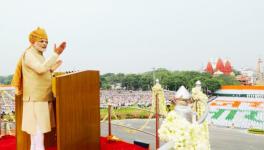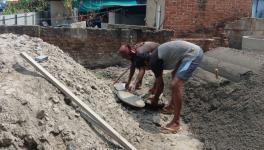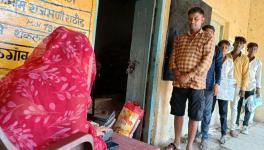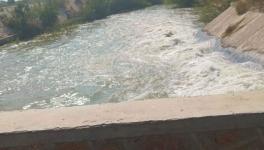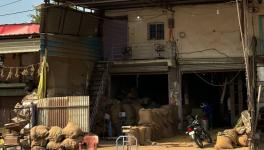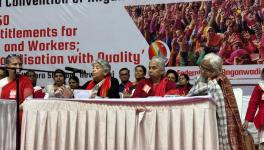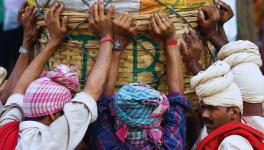Food for Cattle in First World: Not for Indian People
The Food Security Bill is seen as a quick fix to the problems of poverty in India. While there is no denial of a large mass of Indian people affected by hunger and malnutrition, there is a need to look into the provisions of the Bill and not just what it claims to do. Will it threaten the PDS? Will a few households be excluded from the new scheme? Newsclick discusses the defects in the Bill with Smita Gupta, Economist at the Institute of Human Development.
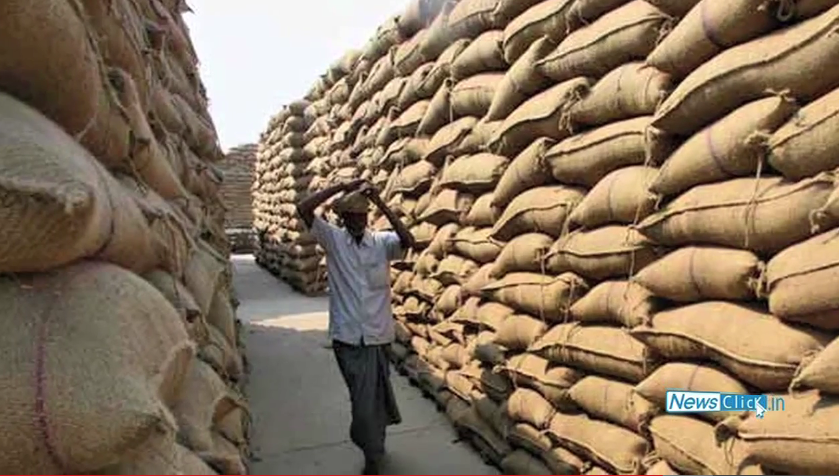
Prabir Purkayastha (PP): Hello and welcome to Newsclick. Today we have with us Dr. Smita Gupta, who is a researcher and has been active on the issues of agriculture, employment and so on. Welcome Smita. Good to have you with us.
Smita Gupta (SG): Great to be here.
PP: The food security bill is now on the anvil. It is, of course, it was lying there for quite sometime. Now, the issues involved would be, what is the objective of the bill, does this bill fulfil those objectives? These are some of the issues which need to be addressed. So, first tell us why do we need a food security bill at all and what should be the objectives of such a bill.
SG: Actually, it is an admission by everybody in government and outside that the problem of malnutrition and hunger is endemic and it is widespread. So there is no section of Indian society except perhaps the top four or five percent which remains untouched by hunger and malnutrition. This gets manifest in very poor health achievements and attainments. Anaemia for example - about half of India's women and more than that children are affected by anaemia. You look at low body mass indeces. You look at any of the indicators of health, of general well being and of malnutrition and you find that it is extremely widespread and this is something that the Prime Minister has not once, but has said a hundred times in the last ten years or nine years of the UPA government. Therefore, we have this big problem which has persisted for a long time. That's the first point. The second point is that it has been very slow to go away. So even when you have had high rates of growth of economy, when you have had low rates of growth of economy, so when other development indicators have either been high or low, irrespective, hunger and malnutrition has been pervasive. It has been unaffected. Therefore, the whole argument that growth would lead in itself to less hunger has not happened. For this reason - the fact that it is widespread, and the fact that it effects vast sections of our people, for these two reasons it's important to have entitlements, legal entitlements to food.
PP: So, does it mean that the food security has not been recognised as a right to food and this is the part of right to life in that sense?
SG: Well, it does derive from right to life certainly and the right to food is a right which is actually most fundamental to the right to life, because if you don't get food, if you can't live, then what is the point of talking of any other fundamental rights.
PP: Except for drinking water, perhaps.
SG: Perhaps water, no; I would put water and food actually together. In fact, you would know that in the original discussions, we had talked about both water and food together. But the government was not very keen to make that so wide. The right to food as a constitutional right is very important and the preamble of the first version of the bill actually said the right to food for all citizens of India, which brings me to the biggest problem of this bill, which is that it is now restricted to just about what the government says about 75% of the total population. But in fact, it would mean 50% in urban areas. So half of urban India, where roughly half of India's population is today concentrated, is going to be excluded under coverage from this bill. Therefore, even as we recognise widespread the problem of hunger and malnutrition, we recognise the need to entitle people to right to food, at the same time we are not looking at a bill which is going to do that.
PP: Well, when we look at this bill we also have to take into account, we already have a public distribution system. Does this bill subtract from the existing public distribution system or adds to it? Or does it, in effect, completely separate from the public distribution system. How do the two reflect on each other?
SG: Ok. Loot at the public distribution system currently - what do we have? We had a universal public distribution system, till we had got the targeted PDS. Now once the targeted PDS came,
PP: When did this happen?
SG: That happened in the mid 1990s. So when the targeted PDS came, at that time we divided the population into two groups. We divided them into APL or above poverty line and BPL or below poverty line. And at that moment, what we did was, we converted the poverty line from an analytical tool to actually, a tool of entitlement. So then you had to estimate not just how many people were poor but then identify those poor and entitle those who were poor and those who were non-poor differently. So the current PDS divided people into these two different categories. The bill through many changes, writing and rewriting, today has reached a point where the amendment moved by the government is going to give 75% of the population entitlements. Currently, what is the situation. What has happened is many states have got near universal schemes. So that more than 80% of the population and about I think 9 to 10 states are getting subsidised food grains at Rs. 2, Rs. 3, Rs.1. It varies across states and across grains. But, about 8 to 10 states, some of the bigger states, have universal entitlements. What we are doing is, if you look at the total number of households who are getting BPL benefits today and then we compare that to the total number of households who would get BPL benefits after this bill is passed, then we find that the number is going to be less in at least 8-10 states and in the other states it depends on what the final exclusion criteria is.
PP: Even if there is an entitlement in terms of a food security act which gets passed by the parliament, in effect the existing provisions of the PDS would actually be curtailed rather than be expanded for removing, as you said, malnutrition and hunger. Is that what the impact of this bill is?
SG: Absolutely, what it is going to do, is going to raise prices. The first impact is that it is going to have is to reduce the total amount of grain that people will get as a right in these states which have near universal schemes. Number two its going to remove the number of households. Number three is, its going to make it more costly.
PP: How it is going to make it more costly?
SG: Because, now the price of the food grain is Rs. 3, 2, 1 depending on wheat, rice and coarse cereals but it also means that, you know, they have a clause in the bill which says that the prices can be revised and linked to the minimum support price.
PP: That means the amount that you will get will remain unchanged, but the prices will rise irrespective of the purchasing power. Is that what you mean?
SG: Yes, you see, what do we mean by food security? Any one of us with common sense will understand that to give somebody food security, you assure them grain at an affordable price. The crucial word is affordable, their ability to pay. Now, here what the government is doing is, it is getting all mixed up. The principle of pricing is shifting from the ability to pay to what it costs the government to procure the grain. Now, you know, that the price of procurement is linked to the cost of production and today with the retreat of the state from subsiding a lot of inputs which is going into the agriculture whether it is seed, fertilizer, extension services and so on; given this, what is you find is that the cost of production in agriculture has gone up. So you have this situation where the government, if it raises with one hand the minimum support prices which it gives to farmer, on the other hand takes away by raising the cost at which you buy food from the PDS because you are shifting from the ability to pay as a principle of pricing of food grain to what the minimum support price is or your cost of purchase.
PP: That's interesting because right now the government is talking about increasing the gas price for example, for what people have pointed out benefit of Reliance and Mr. Ambani. Now if that happens what it means is the fertilizer subsidy conceivably could increase by 16000 to 20000 crores which means that is additional amount then would be recovered through this pricing mechanism because that is to be reflected also may be to the minimum support price with subsidies withdrawn.
SG: Obviously, so what this means is that all the factors that could make the cost of production more in agriculture all these same factors would actually make food more expensive for the poor.
PP: Smita, if we understand this, are we really saying that this food security bill, instead of helping people to access food at more reasonable prices is going to cut down from the existing PDS and therefore what we are getting is in the name of food security, is the curtailment of their rights?
SG: I would put it little differently. I would say that in many states, this would happen. There are some states where PDS is so poor today because I am not here to bat for current PDS. There are many problems in the PDS and the problems are not only of leakages because which is the favourite issue that government keeps pointing to, but there are problems of supply from the centre. You find that since supplies are related to off-take and off-take is related to price, so the whole thing becomes a vicious cycle and states do not get the food that they can distribute through the PDS. So there is a problem of a short supply through the PDS. There is a problem of leakages and now with the bio-metric system being introduced into accessing these rights there is a new set of issues which has come up. In many states, there is a problem with the PDS. But this bill, is not going to reform those problems, it's going to only add to them.
PP: Could worsen them. The other thing that I wanted to ask you, the PDS the much reviled PDS which a lot of people would like to really dispense with and make it everything market. We have market fundamentalists. Now some of the states have actually improved the PDS system quite remarkably in last say, 10 years. So PDS can be improved. We have seen Tamilnadu for example, we have seen Chattisgarh and so on. So there are clear examples by which actually PDS can be improved than we have seen it being improved. So instead of focusing on them, basically to substitute something else, do you think that is what the government really wants to take away from the existing schemes and actually try and do some other schemes?
SG: Actually, what the government wants to do; I will answer your first question later but taking from the last point you made, what the government really wants to do is to cut its expenditure. In the name of providing food security, it wants to reduce its food subsidy burden. Its intent is clear by the really abysmal provision made, additional provision made for this new act which is going to come in the budget itself which you must have seen. So, the government's intent is to have a game changer for the elections but one that reduces their expenditure because their success in the states which you mentioned, or any state which has actually improved its PDS - the NSS data is actually showing some improvement. The success has come only from two factors. The first is universalisation, the moment you make it a near universal scheme, when you cover more and more sections of society and bring them under the PDS it has improved its functions. It has given a greater stake to a larger number of people. That's the first reason; and the second reason is the panchayats and other systems of monitoring have ensured greater accountability and transparency including some technological innovations which have been made whether it is through GPS guided tracking of the trucks ans so on, to reduce the leakages. So there has been a very crucial role played by universalisation or near universalisation in improving the PDS in many states. But the central government doesn't want to learn from that and the only reason for that because it is well documented. Many of us went to the standing committee and presented this to them. The only reason that they don't want to do it, is because they claim they don't have the money to do it and they don't have the grains to do it. Now both these arguments you would agree with me are totally false because today we are sitting on sixty million tonnes of food grains and its just not this year. What are we doing to these sixty million tonnes of food grains? We want to export them as cattle feed to first world cattle. You are not willing to give them to our people.
PP: By your discussion, clearly suffering are the huge amount of malnutrition..
SG: Absolutely. So the sixty million tonnes was the golden opportunity to, to actually have a true game changer for the people of this country if not for the UPA. But they are not doing that. As far as money is concerned, you know that this years budget documents show that the taxes foregone for the corporate sector are far higher than the fiscal deficit itself. The difference is 40,000 crores. So the taxes foregone are close to 6 lakh crores. So therefore, a country which can give away on a platter to the corporate sector such huge tax benefits which exceeds its fiscal deficit; for such a country to argue that it doesn't have the money and to sit on 60 million tonnes which its going to let them to rot, you let them exported, as cattlefeed, and look at the prices at which it is happening. The farmers did not benefit because you did not pay them the price at which it was exported. The consumers did not benefit because you are actually not giving them the grain at the price at which you were exporting. So, neither Indian farmers nor Indian consumers benefited and you are getting just rid of it in an international market which is today suffering from a scarcity of cereals.
PP: So the net beneficiaries are the cattle in the first world. So, basically what you are saying is that we really need to take a hard look at the provisions of the bill not just what it claims to be. The claim may be making food as a right, but what you are really doing is trying to cut down the fiscal deficit and reduce the burden at least of the budget for the poor. Thats what seems to be..
SG: Yeah, one more point I would like to make Prabir, you know when you are looking at what government is designing this exercise towards, they are talking about cash transfers, in fact in the bill itself some of the entitlements are linked to reforms. The reforms are to give it through cash transfers. What they call direct benefit transfers and link it to the UID scheme. So there is whole biometric identification and so on. Now, in the case of food to do cash transfers, is such a terrible and cruel joke. In an inflationary situation where you cannot assure people the actual direct provisioning of food, you are going to just throw them mercilessly on the market. So the intent behind this in my view is to slowly shift even more to cash transfers and to reduce the subsidy further.
PP: And to make it market based distribution of food, in that sense. The operative word is food for cattle in the first world and not for Indian people. Thank you Smita. Thank you very much.
Get the latest reports & analysis with people's perspective on Protests, movements & deep analytical videos, discussions of the current affairs in your Telegram app. Subscribe to NewsClick's Telegram channel & get Real-Time updates on stories, as they get published on our website.











